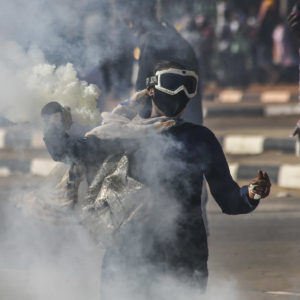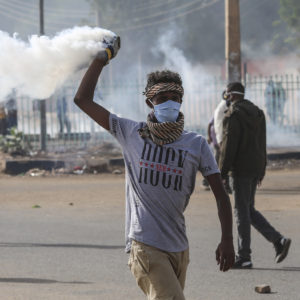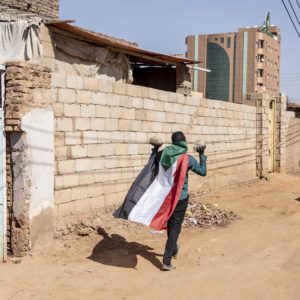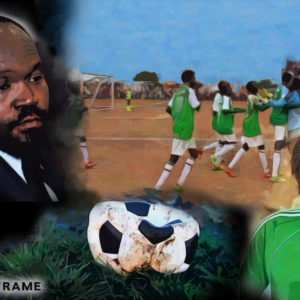Women and ‘three nos’ chart Sudan’s future
Facing violence, detention and death under military control, protesters are organising in localised and sectoral resistance committees calling for and conceiving a shift to civilian rule.
Author:
24 February 2022
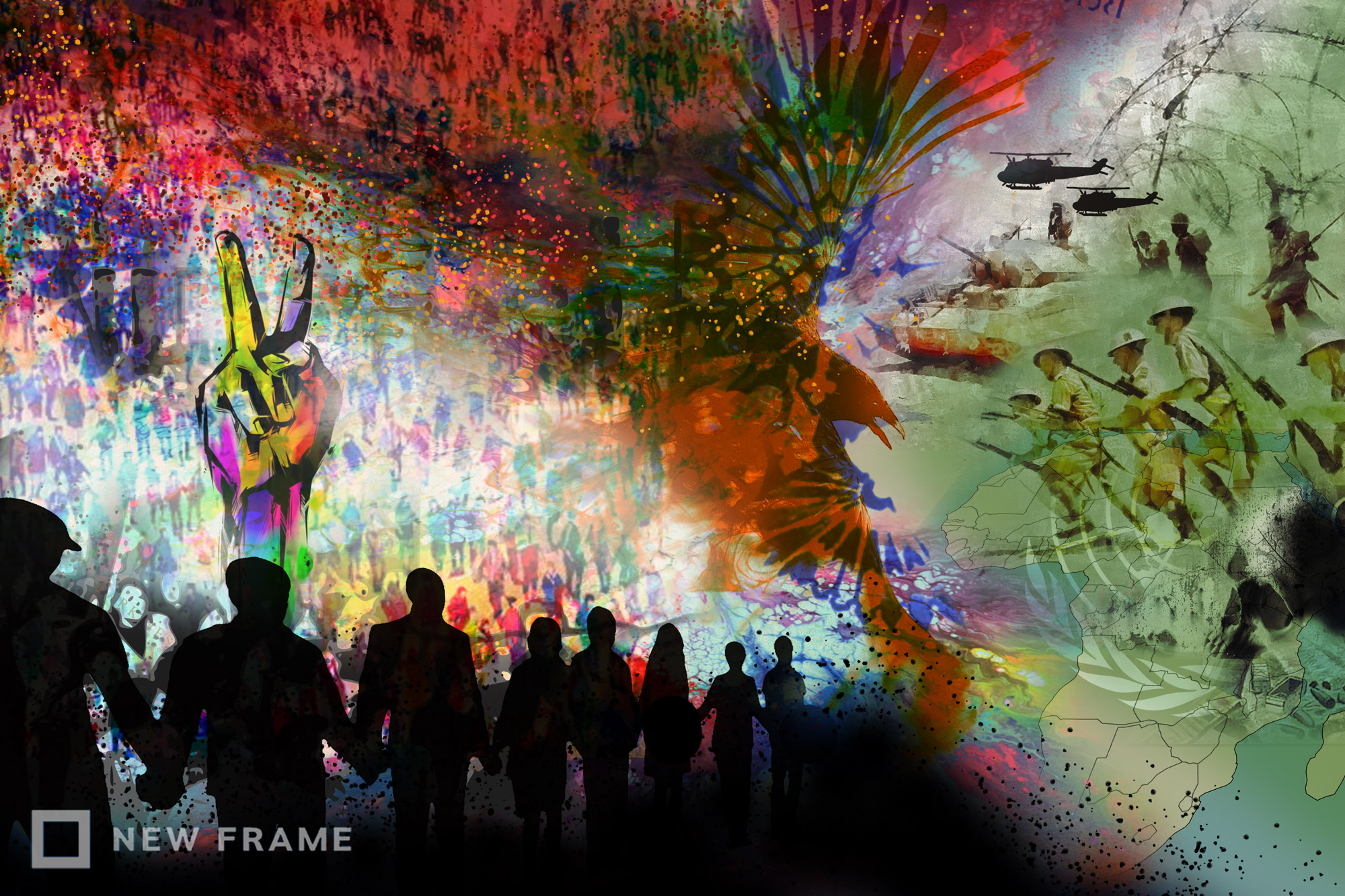
Known as “the anthem to their bullets”, resistance committees across Sudan have remained resolute in defying the military. Their slogan of “three nos” – no partnership, no negotiation and no legitimacy – sums up the core principles behind their resolve, almost four months after the military took control of the government in a coup.
These committees have vowed to shut down Khartoum and permanently destabilise traffic if those who have been unlawfully detained are not released. These include over a dozen artists who were arrested while painting murals in the north of the capital.
On 21 February, Felsai Abdelrahman, 51, died after he was shot in the chest by coup forces while getting some air on the balcony. He had undergone a limb amputation at a hospital in north Khartoum. Protests have taken place every Monday during the month of February and on other odd days. These protests have taken the form of civil disobedience, vigils and peaceful demonstrations. Many Sudanese remain resolute in their fight for justice for all those killed by the country’s security forces. They also want a shift to civilian rule.
Related article:
An open-ended hunger strike was launched on 14 February to protest against the arbitrary detention of political detainees, their ill-treatment and the ban on visits and medical care for them. To date, over 100 detainees are on hunger strike, according to lawyers. The authorities released about 40 political detainees on Tuesday 22 February in a move said to be aimed at presenting a facade of peace to the visiting UN expert on human rights in Sudan, Adama Dieng.
Mohammed Al-Faki Suliman, deputy head of the Empowerment Removal Committee (ERC) was arrested on 13 February. The ERC was established in 2019 during the joint civilian-military rule. Its initial objective was to remove and strip former ruling-party leaders of assets and money they unduly accumulated.
The military junta has been arresting ERC members. They have also dismissed hundreds of military officers from the army to “prevent military coups orchestrated by political parties”. The division within the army has caused concern as many senior officials are purged.
Moreover, protesters continue to block the main artery linking Sudan’s Dongola and the Egyptian border to disrupt trade. They continue to put up bridge barricades that spread to the north and east regions of the country. This is a direct response to Egypt’s alleged support of the coup generals. Protesters are stopping the export of goods to Egypt – mainly food that could benefit famished Sudanese people.
Time for different methods
Different forms of resistance are also spreading to other parts of the country.
A number of resistance committees blocked and barricaded different routes in a fresh round of civil disobedience and peaceful demonstrations to demand the release of political prisoners. A number of blockades were re-established in the Northern state after security forces dismantled them.
Even though many of the protests are generally in opposition to the coup and the military government, some in different parts are being triggered by other concerns. In gold-mining areas such as Delgo, for example, resistance committees organised against mining companies, which they call “death companies”, owing to the negative environmental impact their activities have in the area.
For farmers in northern Sudan, the increase in electricity tariffs is a large source of contention. Electricity in this region rose by 500% in early January 2021, and another hike is proposed for this year.
But an agreement was reached on 14 February in which General Abdel Fattah al-Burhan exempted the agricultural sector from the raised tariff until the end of April on condition that the blockade, which has frustrated freight traffic since 9 January, is lifted.
Khartoum-based Muzan Alneel, a non-resident fellow at the Tahrir Institute for Middle-East Policy, says that for the political leadership of the world to understand the logic of the demands of the resistance committees, it must “give in to grassroots organising that puts people first and [must] put their demands first above geo-political balances”.
Related article:
Alneel says the military government too must consider giving in to the demands of the resistance committees as it is clear that previous agreements that include the military have served no one except the military, and the Sudanese people have learnt this the hard way.
The “three nos” campaign began in early November, a few days after the coup. Alneel says it is a campaign built on lessons learnt over years of resistance.
“The past few years have been a learning process, and most people are out with this sense of, ‘I will not make the same mistakes I made last time’ … What we saw is that negotiations led to compromise and into a partnership that legitimises the military,” says Alneel, adding that the wrong message about attaining stability is sent to those who are marginalised and have grievances across the African continent.
“What you are telling those communities is that if you want to be part of the decision-making process, form a militia … have the weapons, and we will see you worthy of a compromise, a dialogue process and give you, eventually, more than those with a seat at the decision-making table,” she says.
Alneel sees the resistance committees as choosing a different way of defining stability.
“To stabilise the country, [they] realise that you need the satisfaction of the people. If the people are not satisfied, you will not have this country moving, you will not normalise the situation or have the people producing wealth for the country,” says Alneel.
Related article:
Even though resistance committees are not without shortcomings, they can still teach movements across the African continent a lot.
This time, Alneel says, women have been convinced to take a leading role in resistance committees and not get left behind as they were in 2018.
“Women are very committed to this cause … We were cheated last time. We were in the streets and then we were not in the government. Our demands were not represented, and that’s why you see a campaign called ‘join the committee’ directed at women to join the resistance committees that make the decisions about how the streets move,” she says.
Organising by resistance committees is usually around neighbourhood or district-based demands because more and more people are blaming their everyday livelihood struggles on having a military government. A number of resistance committees have charted a political way forward that does not include the military. But Alneel adds that the way that organising is conducted is likely to be an issue in future as more pressing issues will require a national and long-term view, rather than an approach based on districts and neighbourhoods.
“That’s the main characteristic of the resistance committee, because it is neighbourhood-based … they are very connected to the demands of the people … this [however] jeopardises their ability to have a clear political stance. But we are seeing them overcoming that in some aspects,” she says.
The Central Committee of Sudan Doctors (CCSD) has recorded totals of at least 80 deaths or more and under 200 injuries since the coup of 25 October 2021. Economic woes continue to grip the country amid fuel and diesel price increases, among many other price hikes.
Unflinching army
Alneel says there must also be criminal justice and action for all those killed by the army during the revolution, adding that the military’s actions show that they are not open to the process of negotiation or non-violence.
“What they are trying to do is terrorise the people … it seems they’re expecting this type of violence will lead to less people going out on the streets, and if they manage [they will] at least have a picture on the outside that everything is stable and get further legitimacy internationally,” she says.
On 1 February, there was a protest by lawyers against their treatment while inside police stations helping those detained during protests. Doctors and accountants have also previously staged protests. In January, Abdel Hadi Abdallah resigned as acting governor of Al Jazirah state in protest of the disproportionate level of violence against demonstrators.
The military has responded by blocking ambulances transporting those who have been shot with live ammunition and critically injured, and those suffocating from teargas.
Related article:
Many resistance committees have released statements opposing the dialogue process proposed by the United Nations Integrated Transition Assistance Mission in Sudan (UNITAMS), saying it undermines their commitment to the “three nos” and legitimises the coup.
The resistance committees have also declined a Nobel Peace Prize nomination, and ridiculed the level of seriousness afforded them by entities that have “unprofessionally” invited them to engage in dialogue without an agenda.
Even those opposed to public action are agitating for a dialogue and meetings. On 5 February, for example, the Unified Office of Sudanese Doctors – which supports the demands being made on the streets – met with UNITAMS.
Alneel says this shows that the meetings do not have any actual weight in the street. “Those meetings are not impacting neither the organisation nor the size of the protests … The reality on the streets is that nobody cares about it”.
Meanwhile, Al-Burhan has said that the armed forces are prepared to hand over power to a government elected by national consensus. He has not, however, paved the way for that to happen.

